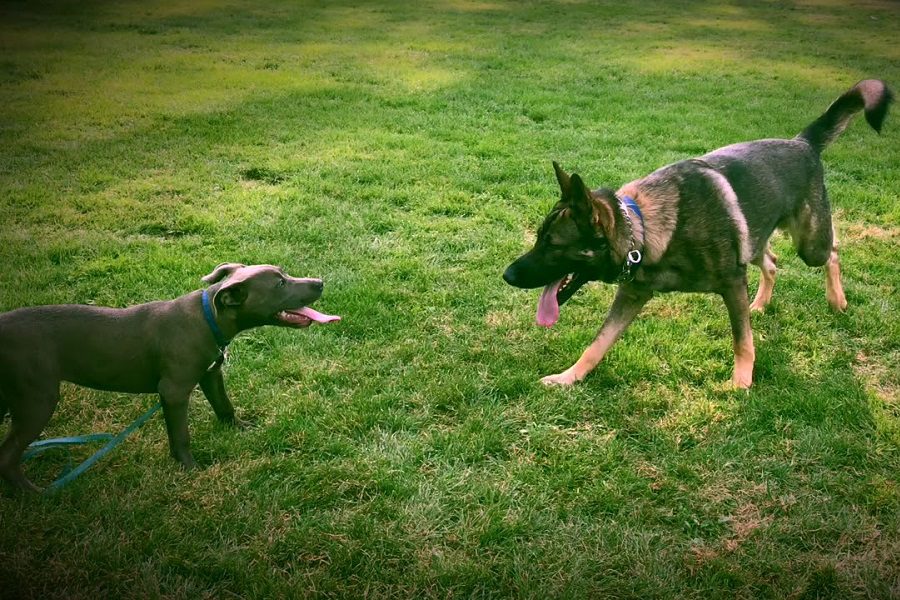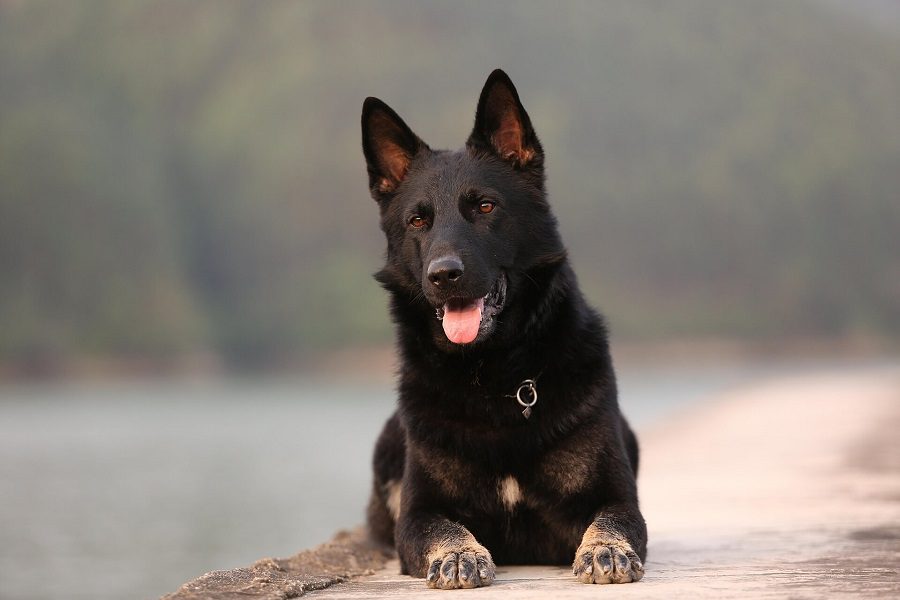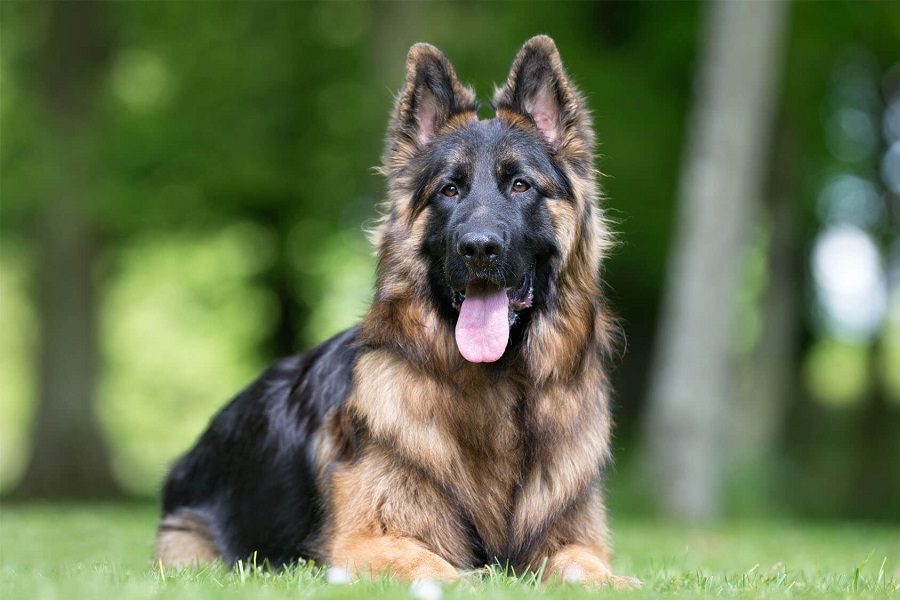Last Updated: 2 years ago
The German Shepherd is a dog that is respected and admired all over the world, due to its loyalty, intelligence and versatility.
It has not been a recognized breed as long as other dogs, but the unique demeanor and physical build of the dog, make it the ideal breed for specialized work and jobs.
Quick German Shephard History
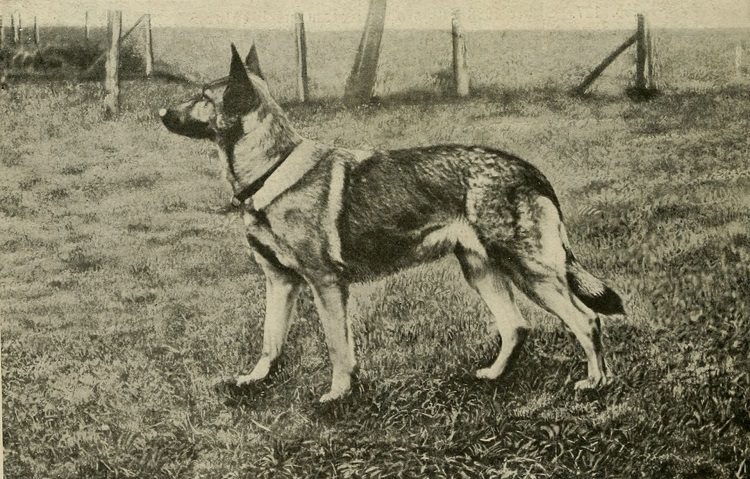
The dog breed did not appear in Germany unit the latter part of the 19th century and was first seen in shows in 1882.
However, this dog was not like the German Shepherd that is known today. The modern version of this breed did not appear until after the conclusion of WWII.
The breed was developed by the cross breeding of working sheep dogs.
It was not until 1906 that the first of this breed were seen in the U.S. Since this occurred, the breed has become extremely popular and is not considered one of the most popular pedigree breeds in the UK and the US and a favorite working breed for a number of forces, especially the police.
This is mainly due to their strong protective instincts.
Common Characteristics of the German Shepherd

Of all the purebred dogs in existence, there is no question that the German Shepherd is one of the most popular. The Shepherd is intelligent, energetic, curious, versatile, loyal and easily trained.
They are also noble and physically beautiful, which helps to explain the appeal of these dogs.
While they can adapt to their surroundings, it is important to remember that no dog is perfect. This breed of dog has a genuine and strong need to be included in all aspects of their family’s daily activities and lives.
They will not thrive if left in a kennel or chained in the backyard. The German Shepherd can also be destructive if they are left on their own for long periods of time.
However, German Shepherds also have a number of natural instincts, which include:
- Prey instinct: which is vital for protection work. The German Shepherd will instinctively chase a moving object and then grasp and hold them
- Fighting instinct: can use active aggression and be on the offensive, which is identified by explosive and rhythmic barking.
- Self-preservation: This is their protective nature and inherent territorialism.
- Pack instinct: This includes both people and animals that are in the work or home environment.
- Social aggression instinct: This is depicted by an ominous bark or growl and indicates dominance and warning that will remain dormant until the dog is faced with some type of threatening situation.
German Shepherd Health Issues
The German Shepherd can suffer from a number of different health issues and be aware of them is the best way to prevent them.
One of the most prevalent is elbow and hip dysplasia. The rate is quite high and during a study where 23,000 x-rays of German Shepherd elbows were taken, 20 percent were shown as dysplastic.
German Shepherds can also suffer from a number of skin issues. In fact, they are quite common in this breed of dogs, especially allergies. Skin allergies result in itchy skin and can result in a number of problems, such as seborrhea, lick granuloma, demodectic mange, calcinosis and other issues.
Autoimmune diseases, where the immune system in the dog attacks its body are also fairly common. The effects of these issues include:
- If the skin is targeted than a number of autoimmune skin diseases may occur, which include vitiligo, nail bed disease, lupus, sebaceous adenitis and perianal fistula.
- If the defective immune system begins to target the other organs than the diseases that may result include myasthenia gravis, megaesophagus and degenerative spinal myelopathy.
Another issue that German Shepherds are prone to involves their digestive system. This can include chronic diarrhea, which results from food intolerances, hemorrhagic gastroenteritis, sensitive stomach, colitis and pancreatic insufficiency.
It is important that the breed eats real food, rather than an artificial kibble.
German Shepherd Size
German Shepherds are a herding dog, the males will grow to reach a height of 24 and 26 inches, while females will be a bit shorter, reaching a height of 22 to 24 total inches.
The weight for these dogs will range between 75 and 95 pounds based on the overall dog’s build.
Personality Traits of the German Shepherd
The German Shepherd has a personality that is not completely aloof, but not usually aggressive, either. It is a reserved dog that will not immediately make friends. However, once they have grown attached to someone, they become extremely loyal.
When they spend time with their well-known and familiar family, they are approachable and easy-going.
However, if they begin to feel threatened, it is likely they will be extremely protective and strong, which makes them the ideal watchdog.
The dog is extremely intelligent and, therefore, easy to train. They thrive on having jobs to do – any type of job.
The fact is, the German Shepherd is able to be trained to complete virtually any type of task, from helping to alert a deaf person to a phone or doorbell ring to finding a victim caught in an avalanche.
Something that this breed of dog is not very good with is being alone for extended periods of time. If they do not have companionship, they will not be able to exercise or put their intelligence abilities to work.
At this point, the dog may become frustrated and bored. If the German Shepherd is under-exercised and they are ignored by their family, then they may put all that pent-up energy to use in ways that you may not enjoy – such as in chewing or barking.
Much like any other dog breed, the German Shepherd is a dog that needs to be socialized at an early age.
The exposure to new and different things can be quite beneficial when the dog is still young. Also, socialization will help ensure that the puppy grows up to be a sociable adult dog.
Care Instructions for German Shepherds

In the past, the German Shepherd was bred to herd flocks throughout the day. This means they are built for action. Due to this desire to move and go, your German Shepherd needs to be able to participate in some type of vigorous exercise each day.
If the dog is left for extended periods of time with no exercise, then the pet owner can expect for there to be trouble. Inactivity and boredom can lead to a number of behavior issues, such as barking, digging and chewing.
German Shepherds are also considered barkers. While this is not always an issue, it can be if the dog becomes bored. This is why it is important to teach them the “quiet” command on demand.
When it comes to food, the German Shepherd requires three to four cups of high-quality dog food each day. This should always be dry food and it should be divided into two separate meals. If the dog is extremely active, then it may require more food than a dog that is less active.
Common Coat Colors of the German Shepherd
German Shepherds are found with a number of different coat colors.
The colors that are recognized by the American Kennel Club include white, liver, blue, sable, black, black and silver, a combo of black and tan, red, cream and silver, as well.
Temperament of the German Shepherd
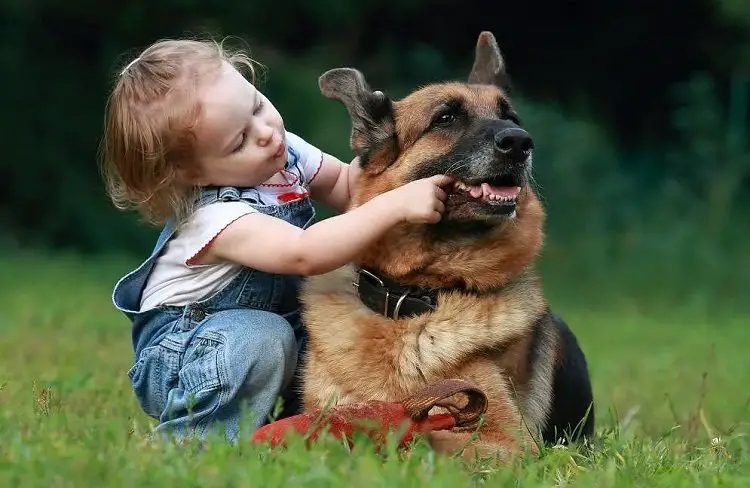
The German Shepherd is considered a loyal family pet, as well as a great guard dog. They are the ideal choice for a number of families, but they require quite a bit of exercise. Training is one of the most important ways to ensure that the dog has a good temperament.
With basic obedience training, you dog will be a much better companion and help to strengthen the bond between the dog, as well as the pet owner. There are classes for this training that will ensure the dog is happy and healthy. Proper training will also lead to a better overall temperament for the dog.
Conclusion
The German Shepherd dog is considered to be a loyal and courageous dog. It has the ability to assimilate and retain its training. If necessary, this dog can be trained to be a punishing fighter, but this is behavior that is not expressed or seen unless the animal feels threatened.
There are a number of German Shepherds that are used as agility dogs, obedience dogs, service dogs and police dogs. This is mainly due to the fact that they are easy to be trained and extremely loyal. When it comes to popular and recognizable breeds, the German Shepherd is definitely at the top.
If you are looking for a family dog, or a show dog or even a protective dog, the German Shepherd is definitely one you should consider. The dog is loyal and protective allowing you to enjoy a smart and trainable companion that you will enjoy growing old with.
When they are properly trained, they offer a number of unique benefits, including loyalty, protectiveness and the ability to help in various types of situations.

